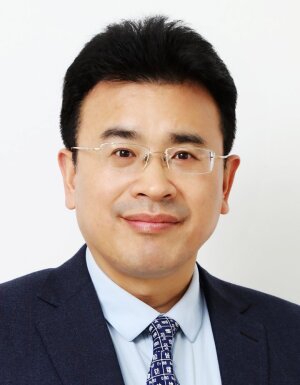
Portrait Prof. Dr. Jun Chen
Foto: Prof. Dr. Jun ChenCurriculum Vitae
Jun Chen is a Professor at Nankai University, Tianjin, China, a Fellow of the Royal Society of Chemistry and an Academician of Chinese Academy of Science.
He received his B.Sc. and M.Sc degrees from Nankai University (China) in 1989 and 1992, respectively. He obtained his Ph.D from Wollongong University (Australia) in 1999. He held the NEDO fellowship at National Institute of AIST Kansai Center (Japan) from 1999 to 2002. He joined College of Chemistry as a full Professor of Nankai University in 2002. He was awarded the Outstanding Young Scientists (2003) and Cheung Kong Scholar Professor (2005). He is the Director of Key Laboratory of Advanced Energy Materials Chemistry (Ministry of Education) (2009), Dean of College of Chemistry at Nankai University (2016), and Chairman of the Chinese Electrochemistry Society (2015). He was elected a Fellow of the Royal Society of Chemistry (2014) and an Academician of Chinese Academy of Science (2017).
His research covers nanomaterials chemistry and battery technologies. His studies have been granted over 20 patents (in close connection with industrial applications) and have been published in over 370 peer-reviewed journal papers that own citations exceeding 30000 being named a Highly Cited Researcher for 2016-2018 by Clarivate Analytics.
He serves as an Associate Editor of Inorganic Chemistry Frontiers, Science China Materials, and Energy Chemistry, and Editorial Board Members of journals including Advanced Functional Materials, ACS Energy Letters, ACS Sustainable Chemistry & Engineering, Materials Horizons, Nano Research, Batteries & Supercaps, Solid State Sciences, and Journal of Energy Chemistry.
At the Organic Battery Days Prof. Dr. Jun Chen is going to give a lecture on „Consideration on the Preparation and Application of Carbonyl Electrode Materials“.
Learn more about Prof. Dr. Jun ChenExterner Link
Abstract
High-Performance Carbonyl Electrode Materials for Rechargeable Batteries
Organic carbonyl electrode materials have shown intriguing interests in rechargeable batteries owing to their environmental friendliness, structural designability, high capacity, and wide abundance. However, common organic carbonyl compounds are easily dissolved in aprotic electrolyte, leading to fast capacity decay and undesired shutting problems with cycling. We here proposed a series of strategies to develop high-performance organic carbonyl electrode materials for rechargeable batteries from four aspects, including molecular engineering, electrode design, electrolyte optimization, and separator modification [1–3]. For example, linking small molecules to polymers and introducing high-polarity functional groups (such as –OM, M=Li, Na, K, etc.) to active molecules are effective to solve the dissolution problem. Developing high-concentration liquid electrolyte or solid-state electrolyte can also enhance the cycling stability of organic carbonyl materials. In addition, by means of the cation-selective property of Nafion, we constructed very stable aqueous Zn–calix[4]quinone batteries (up to 1,000 cycles with a capacity retention of 87% at 500 mA g−1) with Nafion as the separator. Moreover, we developed molecular electrostatic potential to effectively predict the lithiation process of organic electrode materials. These strategies would promote further development of organic carbonyl electrode materials and their practical large-scale applications in the future.
References
- Q. Zhao, W. Huang, Z. Luo, L. Liu, Y. Lu, Y. Li, L. Li, J. Hu, H. Ma, J. Chen, Science Adv. 2018, 4, eaao1761.
- Z. Luo, L. Liu, J. Ning, K. Lei, Y. Lu, F. Li, J. Chen, Angew. Chem. Int. Ed. 2018, 57, 9443–9446.
- L. Liu, L. Miao, L. Li, F. Li, Y. Lu, Z. Shang, J. Chen, J. Phys. Chem. Lett. 2018, 9, 3573–3579.
